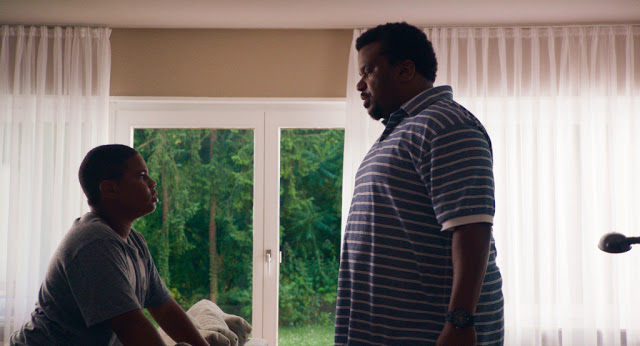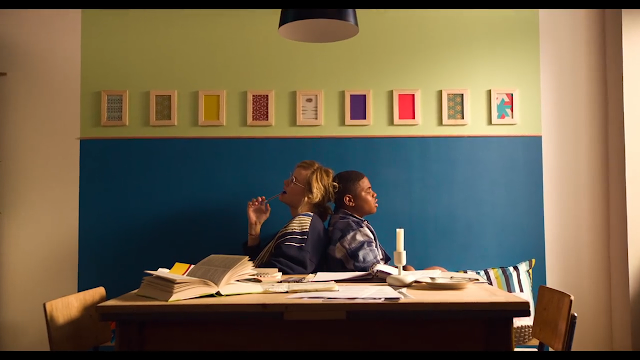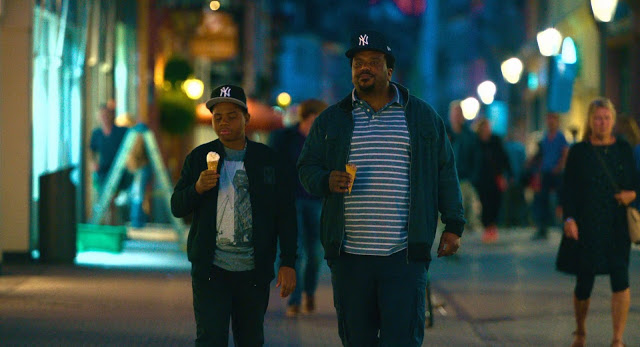Early in the modest and winsome crowd-pleaser Morris from America, a father scolds his son for writing vulgar, misogynistic rap lyrics. When the son counters that his father curses constantly, the father explains, “I’m not mad because it’s explicit, I’m mad because it’s bullshit.” That judgment applies to parts of Morris from America itself. A slender study of disenchanted youths, the film is sometimes false and artificial, even when it postures as authentic. Yet the incisive honesty with which the father delivers his verdict exemplifies what makes this small, heartfelt movie worth watching. As a portrait of a teenager straining to find himself in a cruel and uncaring world, it’s fairly rote. But as a story of the fragile-yet-powerful bond between parent and child, it is wonderfully specific and true.
The son in question is Morris (Markees Christmas), and you can guess where he’s from. The more interesting detail is where he lives; Morris resides in Heidelberg, the touristy German town where his widowed father coaches soccer. His status as an immigrant lends some spice to the film’s otherwise mild recipe. By which I mean, despite its European location, Morris from America—which was written and directed by Chad Hartigan—fits snugly within one of the most durable genres of American independent cinema: the coming-of-age story. It tells the tale of a diffident outsider who struggles to connect with his peers and understand his elders, but who also, thanks to the careful nourishment of his confidence and the attentions of a pretty girl, gradually discovers how to accept and assert himself. As the movie progresses, you can be sure that Morris will fall in love, make some questionable decisions, get his heart broken, lie to his father, and ultimately learn some valuable life lessons.
This level of predictability is not entirely detrimental. There is something pleasurable about watching Morris grow comfortable in his own skin, even if the film inevitably evokes pangs of adolescent trauma. And again, Morris’ predicament has its own racial and geographic peculiarities. (An additional, particularly astute touch: When he is offered ecstasy, he pretends to accede to peer pressure, only to secretly spit out the pill.) As an antisocial black 13-year-old surrounded by cocksure white teens who speak a different language, his sense of alienation is especially acute. He is often the target of casual bigotry; people assume that he likes rap (he does), that he plays basketball (he doesn’t, though that doesn’t prevent a local bully from derogatively dubbing him “Kobe Bryant”), and that he has a large penis (perhaps sensibly, Hartigan leaves this question mostly unanswered). Encouraged by his tutor (Carla Juri, very good) to practice his German at a local youth center, Morris attempts to shrug off these prejudices, but his temper—and his predilection for provocative hip-hop—often gets him into trouble.
Things change when he meets Katrin (Lina Keller), a popular 15-year-old who is strangely drawn to Morris. (Their first meeting, during which Morris initially lies about his age, recalls the iconic “Me too!” scene from Almost Famous.) The reasons for her attraction to him are something of a mystery, though the answer may lie in the shallowness of Hartigan’s script. The tentative not-quite-romance that blooms between Morris and Katrin is crucial to the film’s story, but it feels unfounded, the product of a screenwriting contrivance rather than a mutual fascination between two people. Keller is convincing in the role, but she cannot make Katrin anything more than a one-dimensional slice of pubescent fantasy. The same slimness attends the other teenagers in Morris’ orbit, including that bully (Levin Henning), who proves to be nothing more than a stock villain. Whenever Morris from America limits its focus to its younger characters—such as an implausible scene where Morris delights a crowd of ravers with his freestyling—it feels less like an original story than a copy cribbed from the coming-of-age playbook.
It’s a well-dressed copy, though. Perhaps recognizing the familiarity of his material, Hartigan jazzes up the proceedings with some directorial flair, resulting in a handful of rapturous sequences. (Disclosure: I used to occasionally spar with Hartigan on message boards when he wrote for In Contention (now an arm of Variety), where he routinely disparaged both mainstream movies and the viewers who paid to see them.) Katrin may be a thinly sketched character, but she’s credible as an object of adolescent infatuation, and Hartigan often shoots her in slow-motion, framed dead-center, as though she has become the entirety of Morris’ world. And a scene where Morris fantasizes about Katrin—armed with only her cardigan, a pillow, and the dulcet tones of a Miguel song—is stunning, silently but forcibly illustrating the intensity of his desire. Not everything works—a sequence where Morris imagines tourists head-bobbing in time to his beat feels foolish—but for the most part, Hartigan’s style lends Morris from America some much-needed pep.
The real juice, however, comes from Craig Robinson as Curtis, that aforementioned, hip-hop-critiquing father. A character actor best known for his role as Darryl on The Office—though others may be inclined to cite his unforgettable cameo as a doorman in Knocked Up—Robinson plays Curtis as simultaneously strict and laid-back, a single parent who tends to treat Morris as his friend as well as his child. It’s a part that initially plays to Robinson’s type as a deadpan comic (though casting the heavyset actor as a former star on the soccer pitch is a tough sell), but it also allows him to slyly stretch his range, and he quietly, poignantly essays Curtis as a proud but wounded figure, equal parts loneliness and strength. (Rough footage from this film inspired Sam Esmail to cast Robinson as a heavy in the second season of Mr. Robot.) He may be a cool dad—”you’re ungrounded, let’s go out”—but he is also fiercely protective of Morris, and Robinson plays him as a profoundly decent man who, whether shielding Morris from the world’s perils or explaining them to him, is simply trying to do right by his son.
As tepid as Morris from America can seem during some of its protagonist’s standard misadventures, it feels bracingly alive whenever Curtis and Morris share the screen. The highlight is a beautiful moment late in the film—which Hartigan captures in a graceful long take—where Curtis tells Morris a story about Morris’ late mother, the pain and the joy mingling perceptibly on Robinson’s face. It’s the apex of a movie that doesn’t always achieve, but nevertheless valiantly strives for, a tone of gentle, unvarnished emotion. That the scene concludes with a perfectly profane punch line means that it both conforms to and upends Curtis’ earlier appraisal of Morris’ music. It may still be explicit, but the bullshit is gone, replaced instead by truth.
Jeremy Beck is the editor-in-chief of MovieManifesto. He watches more movies and television than he probably should.




